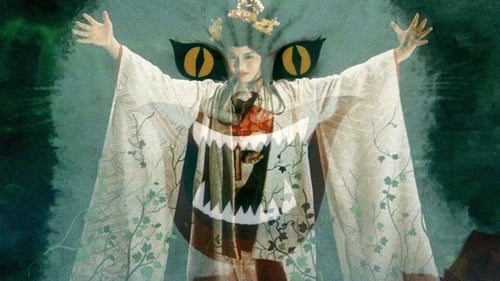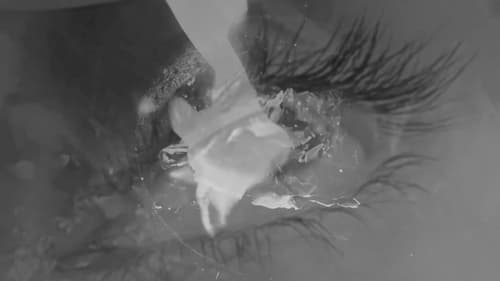All Star Video (1985)
Gênero : Animação, Documentário, Música
Runtime : 32M
Director : Nam June Paik, Ryuichi Sakamoto, Paul Garrin
Sinopse
A compilation of avant-garde artwork and talent of the mid to late 20th century hosted by Ryuichi Sakamoto.

Essentia é um filme experimental onde jovens descentralizados buscam novos olhares para sua rotina através do vestuário, evidenciando o quanto as roupas afetam os nossos afetos. Naoki, Felipa e Neve cruzam seus percursos pessoais e, com isso, encontram novas percepções de tranquilidade, cumplicidade e descanso.

Na esperança de encontrar um senso de conexão com sua falecida mãe, Gorgeous faz uma viagem ao campo para visitar sua tia, na sua casa natal. Ela convida seus seis amigos: Prof, Melody, Mac, Fantasy, Kung Fu e Sweet para se juntarem a ela. Logo, as meninas percebem que há algo além do normal nesta velha casa.

Videoensaio entre o artístico e documental que explora o conceito de Kwaidan (ou Kaidan) no horror japonês, fazendo pontos de contato com as raízes da arte e o desenvolvimento audiovisual do oriente, assim como a relação que foi estabelecida com os centros culturais da Europa.

The video opens with a barrage of explosive imagery along with an audio track of a siren taken from the 1970s TV show Wonder Woman. The following scenes are fast paced repeated shots from Wonder Woman, with several scenes following of actress Lynda Carter as the main character Diana Prince, performing her transformative spin from secretarial role into superhero role. […] The representation of repeated transformations expose the illusion of fixed female identities in media and attempts to show the emergence of a new woman through use of technology. […] The video ends with a scene of repeating explosions that precedes a blue background with white text that scrolls upwards, delivering a transcription of lyrics to the song ‘Wonder Woman Disco'.

After a catastrophic global war, a young filmmaker awakens in the carnage and seeks refuge in the only other survivor: an eccentric, ideologically opposed figure of the United States military. Together, they brave the toxic landscape in search of safety... and answers.

A compilation of avant-garde artwork and talent of the mid to late 20th century hosted by Ryuichi Sakamoto.

An experimental film comprised of Stanley Kubrick's THE SHINING played forwards and backwards at the same time on the same screen, creating bizarre juxtapositions and startling synchronicities

To produce speech, a set of mechanisms must be brought together. What is the normal articulation for speech? How to produce the sounds that make it up in the correct way? A physiological analysis of the aspects of speech shows us how: the jaw must move in a certain way; the air must be expelled from the lungs in another. Based on the concepts stated in the film "Normal Speech Articulation" (1965), produced by the University of Iowa (USA), we intend to reflect on the way women have been represented, and consequently educated, over the years, both in film and in the media. Largely composed of archival footage, this film intends to make evident, through a montage inspired by Structuralist movements, the violence of this education.

“The lakes, their rounds palms, they drowned the face of the Sky:
I have turned the sphere to look at the Sky". Victor Segalen. Estelas

A filmmaker alone in a forest

The Machine That Killed Bad People is about the cultural and political history of the Philippines leading up to the overthrow of President Ferdinand Marcos in 1986. It also addresses the role of electronic media in the struggle for power, and more broadly, American intervention in the Third World. Using a structure that emulates the way television news programs construct meaning through fragmentation, the tape interweaves clips of Filipino activists and reporters, a fictional television anchorwoman and correspondent, commentary by independent filmmaker Trinh T. Minh-ha, Fagin's off-camera voice and script, and anonymous excerpts from commercial television.

Guy Ben-Ner, one of Israel's foremost video artists, gained international recognition with a series of low-tech films, starring his family in absurdist settings carved out of their intimate spaces and their everyday surroundings. Many of his videos are inspired by screenplays for films, folktales and novels. Analyzing these literary and cinematographic passages allows him to exploit the conventions of film narrative: how to tell a story, captivate an audience through a tale, sustain a degree of tension and entertainment, and so on. At the same time, he corrupts the magic of fiction by openly showing us the entrails of everything he records, without worrying about revealing the tricks of the trade. A large part of his filmic oeuvre features a conglomeration of cinematic and literary references which the artist quotes, adapts or interprets. Ben-Ner self-referentially links the great themes and their literary, cinematic and artistic realization.

When he understood it was all a dream. He decided to stay until eternity, darker since you died.

An auto-documentary about a disenfranchised Everyman and his struggle to re-integrate himself into society. He fails and turns to crime.

Uma mulher reflete sob o parapeito.

In his book "1984", George Orwell saw the television of the future as a control instrument in the hands of Big Brother. Right at the start of the much-anticipated Orwellian year, Paik and Co. were keen to demonstrate satellite TV's ability to serve positive ends-- Namely, the intercontinental exchange of culture, combining both highbrow and entertainment elements. A live broadcast shared between WNET TV in New York and the Centre Pompidou in Paris, linked up with broadcasters in Germany and South Korea, reached a worldwide audience of over 10 or even 25 million (including the later repeat transmissions).

Between surrealism, unusual characters, art and magic tricks, "Swim Little Fish Swim" is a dreamlike journey from childhood to adulthood.

Ao não se reconhecer no espelho, uma mulher entra em crise.

The death of the minotavr talks about the concept of the heroine's journey. Suffering, horror and exhaustion lead the protagonist to a process of transformation, abyss and expiation, because only murdering to minotaur and everything he represents is possible to return to life. From the female gaze, it shows the depth of the emotional wounds caused by domestic violence; the same one that the surrealist Dora Maar lived and that ask why, as a society, instead of killing the minotaur, we blindly continue to send him women only to be devoured and ask them why they simply did not fight, why they did not try get out of the labyrinth.















